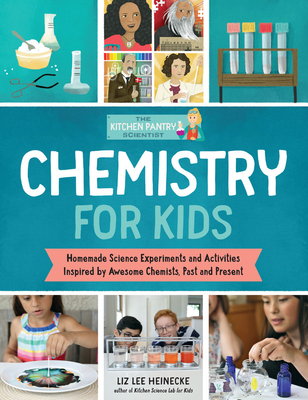The Kitchen Pantry Scientist: Chemistry for Kids: Homemade Science Experiments and Activities Inspired by Awesome Chemists, Past and Present

The Kitchen Pantry Scientist: Chemistry for Kids: Homemade Science Experiments and Activities Inspired by Awesome Chemists, Past and Present
Replicate a chemical reaction similar to one Marie Curie used to purify radioactive elements Distill perfume using a method created in ancient Mesopotamia by a woman named Tapputi Aspiring chemists will discover these and more amazing role models and memorable experiments in Chemistry for Kids, the debut book of The Kitchen Pantry Scientist series.
This engaging guide offers a series of snapshots of 25 scientists famous for their work with chemistry, from ancient history through today. Each lab tells the story of a scientist along with some background about the importance of their work, and a description of where it is still being used or reflected in today's world. A step-by-step illustrated experiment paired with each story offers kids a hands-on opportunity for exploring concepts the scientists pursued, or are working on today. Experiments range from very simple projects using materials you probably already have on hand, to more complicated ones that may require a few inexpensive items you can purchase online. Just a few of the incredible people and scientific concepts you'll explore:
Galen b. 129 AD
Make soap from soap base, oil and citrus peels.
Modern application: medical disinfectants
Joseph Priestly b. 1733
Carbonate a beverage using CO2 from yeast or baking soda and vinegar mixture.
Modern application: soda fountains
Alessandra Volta b. 1745
Make a battery using a series of lemons and use it to light a LED.
Modern application: car battery
Tu Youyou b. 1930
Extract compounds from plants.
Modern application: pharmaceuticals and cosmetics
People have been tinkering with chemistry for thousands of years. Whether out of curiosity or by necessity, Homo sapiens have long loved to play with fire: mixing and boiling concoctions to see what interesting, beautiful, and useful amalgamations they could create. Early humans ground pigments to create durable paint for cave walls, and over the next 70 thousand years or so as civilizations took hold around the globe, people learned to make better medicines and discovered how to extract, mix, and smelt metals for cooking vessels, weapons, and jewelry. Early chemists distilled perfume, made soap, and perfected natural inks and dyes.
Modern chemistry was born around 250 years ago, when measurement, mathematics, and the scientific method were officially applied to experimentation. In 1896, after the first draft of the periodic table
PRP: 123.94 Lei
Acesta este Prețul Recomandat de Producător. Prețul de vânzare al produsului este afișat mai jos.
111.55Lei
111.55Lei
123.94 LeiLivrare in 2-4 saptamani
Descrierea produsului
Replicate a chemical reaction similar to one Marie Curie used to purify radioactive elements Distill perfume using a method created in ancient Mesopotamia by a woman named Tapputi Aspiring chemists will discover these and more amazing role models and memorable experiments in Chemistry for Kids, the debut book of The Kitchen Pantry Scientist series.
This engaging guide offers a series of snapshots of 25 scientists famous for their work with chemistry, from ancient history through today. Each lab tells the story of a scientist along with some background about the importance of their work, and a description of where it is still being used or reflected in today's world. A step-by-step illustrated experiment paired with each story offers kids a hands-on opportunity for exploring concepts the scientists pursued, or are working on today. Experiments range from very simple projects using materials you probably already have on hand, to more complicated ones that may require a few inexpensive items you can purchase online. Just a few of the incredible people and scientific concepts you'll explore:
Galen b. 129 AD
Make soap from soap base, oil and citrus peels.
Modern application: medical disinfectants
Joseph Priestly b. 1733
Carbonate a beverage using CO2 from yeast or baking soda and vinegar mixture.
Modern application: soda fountains
Alessandra Volta b. 1745
Make a battery using a series of lemons and use it to light a LED.
Modern application: car battery
Tu Youyou b. 1930
Extract compounds from plants.
Modern application: pharmaceuticals and cosmetics
People have been tinkering with chemistry for thousands of years. Whether out of curiosity or by necessity, Homo sapiens have long loved to play with fire: mixing and boiling concoctions to see what interesting, beautiful, and useful amalgamations they could create. Early humans ground pigments to create durable paint for cave walls, and over the next 70 thousand years or so as civilizations took hold around the globe, people learned to make better medicines and discovered how to extract, mix, and smelt metals for cooking vessels, weapons, and jewelry. Early chemists distilled perfume, made soap, and perfected natural inks and dyes.
Modern chemistry was born around 250 years ago, when measurement, mathematics, and the scientific method were officially applied to experimentation. In 1896, after the first draft of the periodic table
Detaliile produsului










